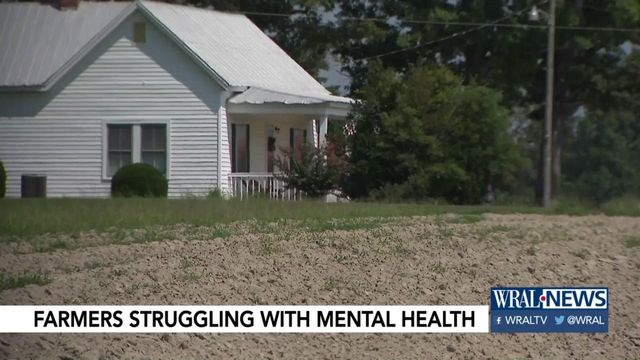North Carolina farmers dealing with a mental health crisis
North Carolina farmers are facing unprecedented levels of stress causing concern about depression and suicide.
Posted — UpdatedHe always thought the cooler was the safest place for a crop. That was until a bird landed on a local transformer and somehow caused a power outage. Vollmer opened his warm cooler the next morning to find his crop ruined. The broccoli was brown.
"It was an overwhelming feeling of loss and sadness, real sadness," he said.
"I had to physically grab hold of the tractor just so I could stay up, and I cried like a baby."
It wasn't just this loss that caused Vollmer to react in this way. It was what he called compounded stress, and it was a low point in a period of severe anxiety for the man running Vollmer Farm in Franklin County.
"I've had stress before, but nothing so compounded that you could feel the weight of that stress," Vollmer said.
Robin Tutor-Marcom is the director of the North Carolina Agromedicine Institute, and she has heard many stories like Vollmer's over the last few years. That's why a lot of the focus of the Agromedicine Institute is now on farmers' mental health.
"Farming has been in such a transition that it's not the farming of our grandfathers. It's not the farming of our fathers," she said.
Tutor-Marcom worries about depression and suicide among the farmers in North Carolina who are facing that transition.
Tobacco is no longer the reliable crop it once was. That, coupled with the recent serious storms and tariffs, is leading to unprecedented levels of stress. Farms that, in many cases, have been in the family for generations are in danger of being lost.
"We do have farmers who have come into cooperative extension offices or farm credit offices and said, 'You know, there's no solution for this except for me to go home and get my gun,'" said Tutor-Marcom while talking about farmers who could be at risk for taking their own lives.
"We think that, going into the fall and the winter, we may see a true escalation, so yes, we are gravely concerned. I think about it every day," she said.
According to a study from the Centers for Disease Control, farmers are three times more likely than the average American worker to die by suicide.
The NC Agromedicine Institute is in the process of training people to deal with extreme farm stress. The training includes teaching people what to look for in a person's behavior that could show they are at risk of suicide or battling depression. They are also trying to find psychiatrists and therapists who are familiar with the unique nature of farming.
Typical treatments like medication are not possible for farmers who have to operate heavy equipment daily.
Vollmer, who is now relying on his devout faith, said he feels better but knows the extreme feelings could return at any time. That's why he is part of the outreach in North Carolina and is sharing his story in the hopes it helps others in his position to feel more comfortable talking about mental health.
"I do find myself having more regular conversations with farmers and friends," Vollmer said. "I think what we are doing right now in just having conversationd is the best way to start this."
Tutor-Marcom said it will take a lot of people and a lot of work and she is encouraging neighbors to check up on neighbors.
"The need is great," She said. "It's going to take quite a team of folks to be able to turn this around."
Related Topics
• Credits
Copyright 2024 by Capitol Broadcasting Company. All rights reserved. This material may not be published, broadcast, rewritten or redistributed.





